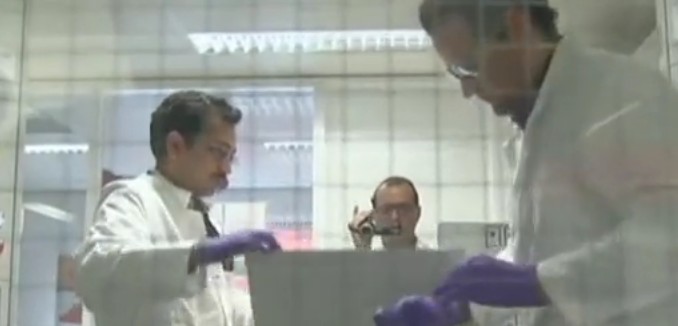The recent revelation that international inspectors failed to rid Syria of its chemical weapons arsenal, due to interference from the regime and incomplete knowledge of the full extent of the country’s stockpiles, has raised concerns about how effective the recently concluded nuclear deal with Iran can be. Ely Karmon, a senior research scholar at Israel’s International Institute for Counter-Terrorism (ICT), made such points in an op-ed today in Ha’aretz.
The recent Wall Street Journal article “Mission to Purge Syria of Chemical Weapons Comes Up Short” offers an extremely worrying picture about the international operation to dismantle Syria’s chemical arsenal. According to the article, Syrian leaders lied from the beginning about the quantities and quality of the chemical arsenal. Inspectors were given access only to sites that the Assad regime had declared part of its chemical weapons program, and only with 48-hour notice. Inspectors discovered a fleet of mobile chemical-weapons production facilities housed in 18-wheeler trucks, unlike any other program seen before. At some sites, inspectors suspected the guards were members of the Iranian Revolutionary Guard Corps or an Iranian-backed militia wearing Syrian army uniforms. In addition, the Syrian regime added several research facilities to its official declaration of chemical weapons sites only a year later, in October 2014, including one in Damascus presented to inspectors in May 2014 as a civil research center.
Furthermore, the approach of the governments involved and the inspectors has been hesitant if not outright tolerant. The U.S. and other powers never exercised the right to demand access to undeclared sites because they “didn’t want a standoff with the regime.” U.S. intelligence agencies gave the regime an informal grade of B-plus for truthfulness, although many inspectors were skeptical about the Syrians’ claim that they had destroyed hundreds of tons of mustard agent before agreeing to the inspections. Members of the inspection teams didn’t push for answers to important issues, worried that it would compromise their “primary objective” of getting rid of the admitted 1,300 tons of chemicals. Meanwhile, earlier this year, American intelligence agencies tracked the regime’s increasing use of chlorine-filled bombs and the production of more effective such bombs by Syria’s scientists, the Journal states.
Karmon pointed out that comparable obstacles—access to suspected nuclear sites managed by the same nation that is suspected of cheating—will prevent the Iran deal from being an effective means of preventing the Islamic Republic from developing nuclear weapons.
If this is the record of the international community in dismantling and monitoring the chemical and nuclear facilities in Syria, how exactly it will do better in monitoring the vast Iranian nuclear infrastructure? Would indeed Iran, the cat guarding the milk, be responsible for collecting its own soil samples from suspected nuclear sites to turn over to the IAEA for inspection, as revealed during the first Senate Foreign Relations Committee hearing on the nuclear deal?
Columnist Bret Stephens of The Wall Street Journal made similar observations in his column (Google link) today, describing the dynamic that has affected the international community’s ability to deal effectively with Syria, and how it is likely to be repeated with Iran.
The agreement meant that inspectors were always playing by the regime’s rules, even as Washington pretended to dictate terms. Practical considerations tilted the game even further. “Because the regime was responsible for providing security, it had an effective veto over inspectors’ movements,” the Journal reported. “The team decided it couldn’t afford to antagonize its hosts, explains one of the inspectors, or it ‘would lose all access to all sites.’ ”
In other words, the political need to get Mr. Assad to hand over his declared stockpile took precedence over keeping the regime honest. It helped Mr. Assad that he had an unwitting accomplice in the CIA, whose analysts certified that his chemical declaration “matched what they believed the regime had.” Intelligence analysts at the Pentagon were more skeptical. But their doubts were less congenial to a White House eager to claim a win, and hence not so widely advertised.
You can expect a similar pattern to emerge in the wake of the Iran deal. Western intelligence agencies will furnish policy makers with varying assessments; policy makers will choose which ones to believe according to their political preferences. Tehran will cheat in ambiguous and incremental ways; the administration will play down the violations for the sake of preserving the broader deal.
[Photo: euronews (in English) / YouTube ]




